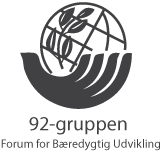Download høringssvaret som pdf her
Copenhagen, January 13, 2023
To the Danish Business Authority
Consulting Response regarding the European Sustainability Reporting Standards (ESRS)
The Danish 92 Group1 hereby wishes to present our most important key points related to the ESRS.
In general, the Danish 92 Group welcomes the ESRS and acknowledges the effort laid in the process, as well as the involvement of stakeholders through the partnership.
It is important to clarify, that by listing issues that we welcome, we are also saying that these are issues that in our view must not be cut, amended, or changed. Hence, in case other stakeholders have opinions or suggestions that challenge or degrade the quantity or quality of these issues, we will be in disagreement.
We welcome that the ESRS lay down a framework for sustainability reporting which provide clarity on what are minimum requirements, set a common structure for reporting on both impacts and risks, and address the most pressing conceptual and methodological challenges companies are facing. The ESRS are indispensable for levelling the playing field and tackling greenwashing.
We warn against further cuts into the proposed set of standards, which would severely undermine its functionality and hinder EU’s efforts to create a more sustainable and just economy.
We welcome that the CSRD and ESRS will contribute towards addressing greenwashing.
Legislative action is the only way to level the playing field and get much needed data to banks, investors, supervisory authorities, governments as well as Non-Governmental Organizations and trade unions.
A 2021 CDP report shows that only one-third of organizations disclosing through CDP reported developing a low carbon transition plan, and no G20 country had more than 4% of organizations headquartered in its
jurisdiction with a credible climate transition plan.
We also welcome that the CSRD and Standard will contribute towards addressing bluewashing.
The 2019 Research Report by the Alliance for Corporate Transparency, shows that only 22,3% of the companies analyzed report on human rights due diligence processes and only 6,9% refer to their commitment to provide remedy for harmed people2.
We welcome the overall architecture and logic of the Standard. The Standard is more coherent, accessible, and easier to use, which is essential for the pertinence of the Standard.
We welcome and we underline the conceptual clarity where it has been improved – e.g., on the concepts of Double Materiality and Impact Materiality, which are essential to the scope of the Standard.
We welcome that the ESRS E1 on climate change requires disclosure of investments, carbon footprint and data on energy consumption (hard metrics), specifies the type of information that must be disclosed on
GHG emission reduction targets and provide a clear framework to present carbon removals and credits (offsets) from these.
We welcome that the ESRS E4 on biodiversity and ecosystems contains disclosure requirements that are mandatory for undertakings in a list of high-risk industries.
We suggest that more clarity is achieved regarding disclosure and remedy. It is necessary to separate “risk” from “impact”, as in “risk” related to financial issues and “impact” related to materiality.
We are concerned that there is still a risk of siloing issues – a point that has not been amended since the first version.
Hence, we suggest that the inter-dependency of issues be ensured by the cross-topical reporting options.
We are concerned that disclosure requirements on targets, as well as on policies and actions apply only if the company has adopted such measures.
The draft ESRS prescribe how companies shall describe such policies, actions, or targets - for its material topics - but the company may simply state that they have not adopted them.
Hence, we suggest that targets are mandatory.
We acknowledge that KPIs are difficult to elaborate for the value chain.
However, we are concerned that it is necessary to ensure proper due diligence.
Hence, we suggest that KPIs are not only established for the company’s own labor force, but should be developed for the entire value chain including local communities and that a plan for the identification of KPIs in the value chain should be made as a starting point.
We suggest that the ESRS and the CSDDD scopes become aligned on the issue of value chain when assessing impact materiality, especially regarding the downstream part of the value chain.
Impact materiality must cover the full value chain, as in the CSRD. The alignment must hence ensure that the CSDDD wording is improved to align with the higher scope of the CSRD.
We underline the necessity for further alignment with the UNGP.
We underline the necessity for coherence with specific EU legislation e.g., the regulation on deforestationfree products and the Corporate Sustainability Due Diligence Directive (CSDD).
Based on these remarks, we call for endorsement by the Danish government to the ESRS framework, without cuts and amendments that weaken the opportunities for responsible and transparent conduct,
undermine the objective and functionality of the CRSD and hinder the EU’s efforts to create a more sustainable and just economy.
1 The Danish 92 Group - Forum for Sustainable Development, is a network of Danish Civil Society Organistaions, working for sustainability, environment, and human rights.
Signatories of this consultation response are (in alphabetic order):
Amnesty International Denmark, AnsvarligFremtid, BirdLife Denmark (DOF), Care Denmark, Danish Society for Nature Conservation (DN), Danish United Nations Association, Forests of the World, Global Aktion, Greenpeace, IWGIA, Klimabevægelsen (350 Denmark), New Europe, Oxfam Ibis, The Danish Family Planning Association, World Animal Protection (WAP), WWF Denmark.
2 Alliance for Corporate Transparency, "2019 Research Report: An analysis of 43 the sustainability reports of 1000 companies pursuant to the EU Non-Financial Reporting Directive", 17 February 2020.

